Your Ballot Selfie May Or May Not Be Legal
Depending on what state you live in, taking a picture of your ballot and yourself on Election Day may or may not be legal.
As Election Day approaches, it’s likely that social media — Facebook, Twitter, and Instagram most explicitly — will be filled with messages from people who have voted announcing that fact with a picture of themselves and their completed ballot. I’ve already seen such messages in my own social networks from friends in states with early voting such as North Carolina and Florida, and among those who are voting absentee. It turns out, though, that many of those people may be inadvertently breaking the law:
If you’re hoping to document your vote by taking a photo of your ballot, you may be headed for a legal gray area that in some states has grown only murkier in the days leading up to Election Day.
Because the laws in several states are muddled, under review or confusing, unsuspecting voters may run afoul of the rules.
Last week, an extensive review by The Associated Press of the array of ballot selfie laws in all 50 states found that 18 states prohibit sharing photos of ballots.
But with only a week until the general election, on Nov. 8, battles are being waged over the legality of so-called ballot selfies in at least four states, including California, Colorado, Michigan and New York.
Activists have also filed a lawsuit in California, which is among at least 13 states where The A.P. found that voting laws were unclear. That state is a good example of how unclear the rules can seem to voters: A 125-year-old law barring people from sharing their ballots has been repealed, but the legislative action won’t go into effect until weeks after the election.
This creates a sort of legal limbo for voters: Can they violate a ban that isn’t being enforced in the first place?
In some cases, lawmakers find, antiquated laws collide with the modern tendency to document the goings-on of daily life, which, every once in a while, involves casting a vote.
In Colorado, a federal judge will soon hear challenges to a 125-year-old law that bars people from publishing their ballots, similar to the one in California. In Colorado and New York, publishing a ballot remains a misdemeanor crime.
According to The Denver Post, the case for keeping the law protects against possible cases of voter coercion.
“We believe the current law protects the integrity of the election and protects voters from intimidation or inducement,” Suzanne Staiert, Colorado’s deputy secretary of state, said in a statement to the newspaper. “In fact, given Colorado’s unique election system and rise of social networking, the prohibition may be more important in Colorado than in other states and may be more timely today than ever.”
This argument was used unsuccessfully by officials in New Hampshire, which overturned a ban on ballot selfies in September. The media company Snapchat was involved in that case and filed an amicus brief that argued ballot selfies were “the latest way that voters, especially young voters, engage with the political process.”
Activists also found the voter-coercion argument moot: “There isn’t much evidence, if any at all, that this kind of activity is actually occurring,” Justin Silverman, the executive director of the New England First Amendment Coalition, told The New York Times in April.
(…)
In other states, lawmakers seem willing to keep the debate over ballot selfies running down to the wire: In Michigan, an appeals court reversed a lower court’s ruling to allow ballot selfies, leaving voters with just over a week to figure out whether the act was legal in their state.
And in New York, three voters filed a lawsuit in October against the ban in a district court. According to The A.P., the judge, P. Kevin Castel, asked why the plaintiffs waited until just before the election to challenge the law.
This map purports to show the state of the law across the country, but I can’t personally vouch for its accuracy:
Given how invested we are in the selfie era, it’s not surprising that people would want to take a picture of themselves and their ballot the same way they take selfies of other parts of their life. Some voting rights advocates have even suggested that doing so, and sharing such pictures across social networks, could help increase voter turnout, especially among younger voters, by turning voting into something of a social activity. Of course, nobody should feel compelled to share their ballot with the world and many people continue to take the idea of the secret ballot quite seriously, and that’s also an understandable attitude. The ballot selfie, then, is the modern-day version of the “I voted” stickers that are handed out at polling places on Election Day and, arguably, have the same purpose of letting others know that you’ve exercised your right to vote and they should too. Just as you can choose whether or not to wear the sticker, you can choose whether or not to take a ballot selfie. What’s not understandable are laws that ban people who are voting from memorializing the same with a selfie that they take themselves and which they have control over. The argument that laws such as this are necessary to protect ballot integrity are rooted in the idea that someone who is being paid to vote a certain way would have to provide some kind of proof that they complied with the terms of what was agreed to, but in that kind of case it seems highly unlikely that they’d end up publishing the photo to their social media timeline. Instead, it seems more likely that they’d take a photo with their phone and only share it with their co-conspirator. In any case, as noted above, there is little to no evidence that this kind of activity is occurring on a regular basis, and certainly not enough evidence that it has anything to do with taking a picture of yourself and your ballot. Given that, it’s hard to justify why laws barring ballot selfies should exist at all.
In addition to the fact that they seem to be banning a practice that doesn’t appear to be a problem, there’s also a fairly decent argument that such laws would be a violation of the First Amendment. There seems to be little question that a person who posted “I voted for [Insert Name Of Candidate]” on Twitter, Facebook, or Instagram would be engaging in activity that is protected by the First Amendment. While the law provides that the ballots we cast are secret, there are no laws preventing individual voters from telling family, friends, or whomever who they voted for and a Court would most assuredly strike down any law that attempted to criminalize such statements as clear violations of the First Amendment. Arguably, the ballot selfie is just a modern manifestation of telling people who you voted for and that it should be allowed the same First Amendment protection as your statement about who you voted for would be. In other words, it’s time for the law to catch up to modern times. Of course, that’s the case in many areas, isn’t it?
Photo via New Hampshire.com
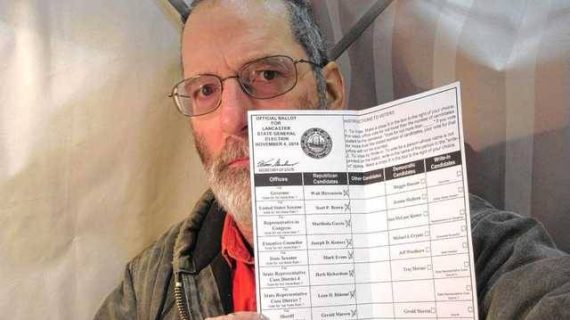
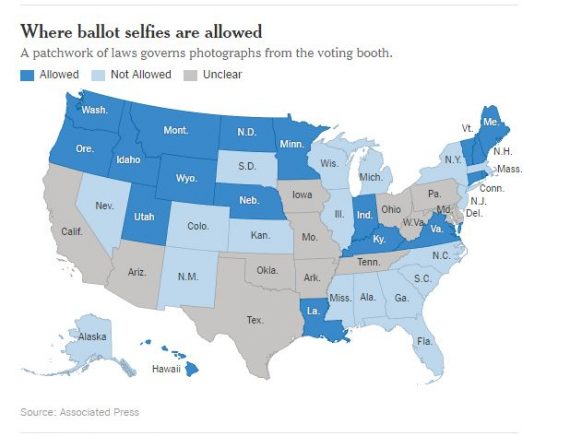


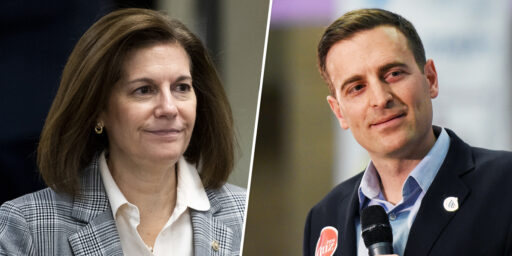
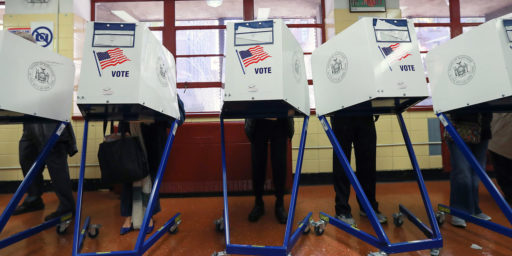
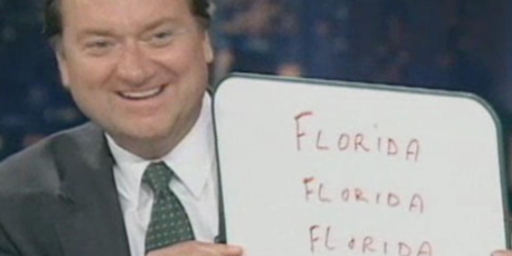
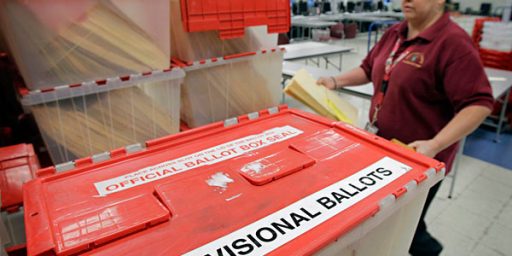
The very idea that someone would desire to take a polling place ballot selfie is lame.
That said, I would not allow these polling place ballot selfies at all – leave those places alone.
I don’t what you do if someone want to post a selfie of the absentee/mail-in ballot.
@al-Ameda:
I tend to agree, but it shouldn’t be illegal.
The fears of vote buying, and voter coercion, are historically well founded. The political machines of the past abused open voting, which is why we now have a secret ballot.
I could easily imagine an employer threatening workers who vote the wrong way, even now. You still hear reports of employers telling the workers that Candidate X is better for the company and better for their jobs. One company that I worked for kept harassing employees to donate to the company PAC, but was always careful to keep within the law.
I don’t see any way to actually enforce this law, though. People carry internet connected cameras with them everywhere. Privacy is mostly dead, and mandatory privacy is completely dead.
Vote buying is also not a big problem these days, to the best of anyone’s knowledge.
Far more concerning is vote by mail, since you could now have someone watching you fill out your ballot, rather than doing voting in a private booth all alone. Abusive husbands, for instance. Or caregivers for the elderly.
WTF. This is like saying we don’t need to enforce the Voting Rights Act because it was working. There isn’t much vote buying going on because it’s damn near impossible with a secret ballot. There used to be vote buying. We made it impossible. It’s not happening while it’s impossible. Ergo it won’t start happening again if it’s possible?? Say what?
“Boy I sure hope Trump wins. I’ll pay you for half a day off to vote if you show me a selfie with your marked ballot, whoever you vote for. Did I mention I think it’s real important Trump wins.” Was that hard?
So true. Reminds me a post I saw a while ago arguing (quite successfully) that museums were giant ancient selfie collections. In those days however, said selfie (once known as a portrait) took days/weeks to make so there was more respect for the process instead of today’s click-n-go. Rather like people respecting artisan pasta dinners at fancy restaurants and poo-pooing microwave ramen. Perspective is everything. Stickers, stamps, selfies – all commemorate what is actually important in various trivial ways.
IDK Doug. Criminal post crimes-in-progress to Facebook. Never underestimate idiots in need of attention.
Still, it’s rather flimsy legal logic being tacked onto laws that are clearly pre-digital. This feels more like someone just not getting what the point is and blanket applying the law rather then adopting to a new trend. Besides, how do they know the selfies aren’t Photoshopped? Are they really going to pay people to troll Facebook and check the veracity of each photo? Who has the manhours to waste on this?
The ballot’s only a secret to protect your privacy and prevent outside pressure; if you willing sacrifice that privacy, that’s your choice. No different then telling people how you voted. If you want it on record forever, then SnapChat away my friends. The Internet does not forgot even if you regret it later.
Regarding those who are arguing that ballot selfies could lead to vote buying, employer pressure, etc. a few thoughts:
1. Correct me if I’m wrong, but Citizens United did away with a lot of laws barring employers from pressuring their employees to vote a certain way. It’s odd to argue that while employers can directly pressure you (like send a letter with your paycheck), you shouldn’t be able to take a picture of yourself, with documentation of your decision/performing civic duty, because your employer might pressure you.
2. Even if vote buying/pressuring does occur, we don’t have to legislate out of existence every possible danger or bad behavior.
So perhaps ballot selfies should be an action that, while entirely legal, is highly, highly inadvisable.
Like going to a Phish concert.
It could be that with technology nowadays and you whipping out an electronic device in a polling booth could be viewed as tool to hack, who knows. It could be this time around people hate the other side so much they want to make sure people would never assume they might have voted for the other side
@Neil Hudelson:
1. Citizens United had nothing to do with employers communicating with employees about elections or candidates, but with the ability of organizations and individuals to campaign for or against specific candidates rather than limiting their advocacy to issues alone. Specifically, it concerned a video and book produced by Citizens United directed at Hillary Clinton. The issue of employers pressuring employees on voting would be, to a large degree, a labor law question that was outside the scope of the Court’s decision.
2. Or silly behavior, which is largely what selfies seem like to me. But then, I’m not really part of the selfie generation. Nor do I understand why so many Instagram users feel compelled to take pictures of their food before they eat it.
Beyond the problem of a bunch of idiots pulling their phones out in a voting area intimidating other voters, they should have a selfie area after the ballot box with fake ballots people can hold up which could represent their actual vote or not, their choice. Then anyone seeking proof of vote for bought votes would never know for sure, just like now.
@JKB:
I don’t know how it works in your state but in mine the voting machine is a closed off area not with a curtain that blocks anyone from looking over the voter’s shoulder. How would it “intimidate other voters” if I took a picture of myself in an area like that?
Also, if someone is engaging in disruptive behavior in the polling place, that’s a different story. Taking a quick snapshot with a smartphone doesn’t seem disruptive to me.
@JKB:
This is actually not a bad idea. A generic pre-printed one with a flag stand or something as a background visual in the exit area outside the immediate voting booths. Satisfy those who want a pic opportunity without compromising the actual voting area.
Hell, they could even charge a nominal fee for it and make some money off this. Capitalism!
@Doug Mataconis: It already takes long enough to vote. I don’t need further delays due to unnecessary narcissism 🙂 I am down with no photos, unless we can get a day off to vote or maybe two days of voting
@JKB: I agree, this is a great solution.
On a side note, I must also mention: some places have long voting lines (for some odd reason, this is usually inner cities). Having people waste time taking the perfect selfie only increased those voting lines.
Seriously. First world problems.
Who cares.
It’s about as damaging as voter fraud in the USA.
I think of voting as a form of speech. Maybe a supreme form.
Photographs are also a form of speech.
Not like rights are absolute but making a record of ones mug and their ballot is not like me yelling “fire” at the Makanda Township Fire Station/Polling Place when I vote there next Tuesday.
(That would probably be disturbing the peace.)
@Neil Hudelson:
The key is that it needs to be impossible to prove how you voted. If it is possible to prove how you voted, then various organizations (licit and illicit) have strong incentives to require such proof. That ranges from the Young Republicans who want to make a ballot selfie a requirement for membership, down to Joe the Knuckle who will break your windows (or your knees) unless you show him proof that you voted against Referendum #7.
I’m normally not a big fan of “slippery slope” arguments, but this one seems pretty clear. Plus, there’s an enormous asymmetry between the potential downsides and the very trivial benefits of allowing such a thing. As Doug notes, you can always tell people who you voted for. The fact that you can’t prove it is a feature, not a bug.
So now we are going to control citizens behavior based on some measure of benefits.
Benefits to the Citizen or the State?
Quite frankly I don’t see why taking a pic of oneself and their ballot has to benefit anyone to be allowed.
The Jackson County Courthouse prohibits cellphones (with exceptions for lawyers, judges, sherrif’s deputies, etc.). The county installed cell phone lockers at the entrance to the building before you get to the metal detector.
I’m sure all the counties in the state will be glad to provide this temporary storage facility at every polling place in the state each election day along with all the other suffrage services they are bound by law to administer.
Wouldn’t want anyone to gain any “trivial benefits.”
@Doug Mataconis:
Thank you for the clarification. My understanding of employer coercion came from this Harvard law review. But I was referring to it based on recollection. I’ll reread this so I’m not talking so much out of my ass, but I’d appreciate your thoughts of its relevant
http://harvardlawreview.org/2014/12/citizens-united-at-work/
@Mister Bluster: Do you really think blocking vote buying is a “trivial benefit”.
8ball: If you have evidence of election fraud by all means provide it to the proper authorties.
@DrDaveT: Additionally, based on my own experiences in abusive environments, I could absolutely see an abusive person coercing their dependents into photographing their ballots as proof that they voted the “right” way.
@Doug Mataconis:
In my area, you bring your ballot into a room with tables that have little “Election” partitions on them like you are taking a test. You fill in the circles then take the ballot to a machine reader that eats it and records your vote (supposedly) electronically. You don’t mill about the table area. In previous years, the reader was at the door exiting the room, this year it was just out in the hall.
I once took a photo of my vote in voting machine in Brazil, but I don´t even bring my cell phone when I´m voting. There are four poll workers(All of them younger then 70) in the room, I don´t take risks.
Any opportunity to ban selfies should be welcome. Making them a capital crime would be even better…
All jokes aside, DaveT gets it right: “If it is possible to prove how you voted, then various organizations (licit and illicit) have strong incentives to require such proof.” This is going to evolve quickly from something that’s cute into a “voluntary” loss of privacy that will, at least for some of us, link a failure to participate to some sort of negative consequence. We seem to be headed full-speed into Brave New World, but with iPhones instead of soma.
I think the move to mail-in ballots completely overwhelms any anti-selfie arguments. I can show my completed ballot to my vote-buyer, mail it right in front of them & collect my $10. Might as well take a selfie, too!
@jd:
I agree with you, but come out with a different conclusion. I have a suspicion (but no solid evidence) that various groups are signing people in nursing homes up for absentee ballots and then “helping” fill them out. The rise in absentee ballots makes me uncomfortable.
Beyond the potential voter coercion by employers noted above, which very well could be a thing, I recently heard from a friend that she knows a woman whose husband has asked her to take a picture of her completed ballot and send it to him. Ballot selfies have the potential to rob some people of their right to vote freely. It might not be a large number, but this is yet another stupid move.
@MarkedMan: Agreed. I think mail in/absentee balloting is the one true area ripe for abuse. That Republicans have wasted inordinate amounts of time and money preventing “fraud” at the polling place is just another example of deflection away from the real issues (while advancing their voter suppression efforts).
I am rapidly losing faith in this country’s ability to make good decisions.
I like mail in ballots, and yes there may be a chance of fraud, on both sides, but those machines are not always reliable either. Maybe we all need to take selfies (kidding of course).
@Doug Mataconis: Taking a selfie at the polling place could run afoul of the prohibition against electioneering at the polling place. Perhaps the polls should have sequestered “selfie areas” for the voters before they post their ballots. And maybe we could give them a hug and a cookie afterwards.
@JKB: “Beyond the problem of a bunch of idiots pulling their phones out in a voting area intimidating other voters, ”
Wow. There’s really nothing in this world that doesn’t terrify you, is there? No wonder you’re a Trump supporter.
Selfie sticks are not allowed in Walt Disney World. Many people don’t know this until they try to go through the gates.
@Mister Bluster:
Well… yeah. Duh.
We do it all the time. Or had you not noticed that there are (say) speed limits on highways, licensing requirements for claiming to be a doctor or lawyer, prohibitions on littering, laws prohibiting the recreational use of spray paint as a mood-altering substance, and a zillion other instances of “controlling citizens’ behavior based on some measure of benefits” — for both individual and collective sorts of benefits.
Odd that you missed that somehow.
You should report this guy if you have evidence that he is threatening voters.
@Jen:
Except it’s not going to stop the abuse by keeping them illegal; it will only punish the victim further and force them into a choice: deny the abuser or commit a crime. Frankly, this could have been happening since portable cameras were a thing and nobody ever gave a damn about a woman’s post-election black eye till selfies took off.
A selfie exception would have to be carefully worded so that protections against racketeering and outside pressure is still illegal. It should be legal for personal use and enjoyment (including posting online at will) but demanding/requiring it should fall under coercion. Think of it in HIPAA terms – the information/pic is privileged info that can be released at will but proof of consent would fall on the non-selfie taker. It’s not perfect, it will have a ton of wiggle room for the dastardly to try and squeeze through but it’s better then nothing.
That’s why JKB’s idea was so good – having the pre-printed ballots for selfie purposes would offer protection in this case for the victim while allowing them to vote freely. There are ways to do this without compromising the safety of the secret ballot. We just need to give a damn enough to check into them before some camera-loving idiot decides to push this one to the Supreme Court. Dismissing selfies as a “trend” and refusing to modify laws accordingly could cost us all quite dearly in that case.
Occam’s Razor would suggest that banning photography in polling places would be a simple solution. That would provide an excuse for voters to not take photos.
Yeah, I coulda’ lived a long and happy life without seeing this.
http://media.gettyimages.com/videos/ronald-reagan-and-wife-nancy-arrive-to-cast-their-vote-in-the-sign-video-id465679794?s=640×640
After a few more elections you might have enough to go see a dentist.
@Mister Bluster: After a few more elections you might have enough to go see a dentist.
You made my avatar laugh.
@wr: Honestly, I’d think someone in a Make America Great Again hat and t-shirt photographing people at a predominantly Hispanic or African American polling precinct would indeed be terrifying to those people.
@James Joyner:
Fair point, but I think the laws and regulations can be written in a way so as to differentiate between someone who is taking photographs of other people at a polling place in a way that might intimidate and someone who is merely taking a picture of themselves with a marked copy of their ballot.